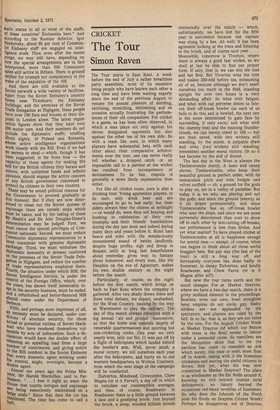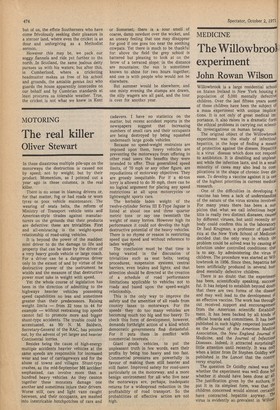The Tour
Simon Raven
The Tour starts in East Kent. A week before the end of July a rather breathless party assembles, most of its members being people who have known each other a long time and have been waiting eagerly since the end of the previous August to resume the annual pleasure of deriding, satirising, mimicking, minimising and on occasion actually frustrating the performances of their old companions. For cricket is a game, as has been often observed, in which a man plays not only against his eleven designated opponents but also against the other ten of his own side. So with a team like ours, in which many players have substantial bets with each other about their comparative achievements over the tour, one can never really tell whether a dropped catch or an impossible call to a partner at the wicket has resulted from incompetence or deviousness. To be fair, crapula is generally a more likely explanation than either.
For like all cricket tours, ours is also a drinking tour. Young apprentice players, to be sure, only drink beer and are encouraged to go to bed early: but their elders always hear the chimes at midnight — or would do, were they not braying and honking in celebration of their own triumphs and their friends' humiliations during the day just done and indeed during many days and years before it. Hotel bars heave and echo with the mendaciously remembered sound of battle; landlords, despite huge profits, sigh and droop in despair, until at long last boastfulness about yesterday gives way to fantasy about tomorrow, and every man, like the Dauphin on the eve of Agincourt, makes his own double century on the night before the match.
Particularly, of course, on the night before the first match; which brings us back to East Kent where the company is gathered. After two shady draws there and three total defeats, we depart, unabashed, for the West Country, pausing by the way at Warminster to play the military. The day of this match always coincides with a big annual 'air and ground' manoeuvre, so that the home side consists largely of venerable quartermasters and sporting but non-cricketing cooks. One year we very nearly won, only our No. 11 was put off by a flight of helicopters which landed behind the bowler's arm. Well, never mind; a moral victory, we tell ourselves each year after the helicopters, and hurry on to our western headquarters in Wotton Courtney, from which the next stage of the campaign will be conducted.
Dulverton, Minehead, Crowcombe, Chew Magna (or is it Parva?), a day off in which to calculate our contemptible averages, and then, of course, Roadwater. In Roadwater there is a little ground between a lane and a gossiping brook. Just beyond the brook, a steep, wooded hillside broods contentedly over the match — which, unfortunately, we have lost for the fifth year in succession because our captain was stung by a bee. Ah well; it has been agreeable looking at the trees and listening to the brook, and of course next year. . . . Meanwhile, tomorrow is Tiverton, where there is always a good fast wicket, so we shall at last be able to find our proper form. If only, that is, we can win the toss and bat first. But Tiverton wins the toss and makes 250-odd before tea, exhausting all of us, because although we don't exert ourselves too much in the field, standing upright for over two hours is a very demanding affair. So what with fatigue, and what with our perverse desire to latecut their off-break bowler (as each of us fails to do this and is bowled, the next one is the more determined to gain face by succeeding, if only once), and what with the clammy heat and the massing thunderclouds, we can barely crawl to 100 — but are then saved, with two wickets still standing, by the storm. A palpable draw and even (two wickets still standing, remember) another moral victory. Or so it has become by the end of dinner.
The last day in the West is always the Timberscombe match. A keen and canny eleven, Timberscombe, who keep their beautiful ground in perfect order, with its immaculate pitch and trim hedges and velvet outfield — oh, a ground for the gods to play on, set in a valley of paradise. But today it is we who are playing and not the gods; and since the ground (seemly as it is) slopes pronouncedly, and since Timberscombe has an off-break bowler who uses the slope, and since we are more perversely determined than ever to show off to each other by late-cutting off-breaks, our performance is less than divine. And yet what matter? To have played cricket at Timberscombe at all is happiness enough for mortal men — except, of course, when one begins to think about all those awful braggart bets. But pay day (the last of the tour) is still a long way off, and fortunately everyone has done badly in Somerset, in sleepy Dulverton, and kindly Roadwater, and Chew Parva (or is it Magna after all?).
But now the tour turns north and the mood changes. For at Market Drayton, where we have a two-day match, there is a gritty midland element in the proceedings. Bowlers, even our own, bowl straighter here; umpires do not smile; gay, flashy strokes are not applauded by the spectators; and players are ruled by the bell. In so far, that is, as they are not ruled by the rain. For the August Cricket Week at Market Drayton (of which our fixture with them is the first) seems to labour under a perennial curse. So merciless are the Shropshire skies that to me the pavilion has come to resemble an Ark which surely, this year or next, must float off to Ararat, taking with it the blameless cricketers and leaving the sinful citizens to drown. And yet, what sin was ever committed in Market Drayton? The place is as wholesome as the flat fields around it, knowing no evil beyond routine rural delinquency, no luxury beyond the occasional red-faced revelries of huntsmen.
So why does the Jehovah of the North pour his floods on Drayton Cricket Week? Perhaps he disapproves, not of Drayton, but of us, the effete Southerners who have come frivolously seeking their pleasure in a sterner land, where even the cricket is as dour and unforgiving as a Methodist sermon.
However this may be, we pack our soggy flannels and ride yet further to the north. In Scotland, the same jealous deity pursues us with his waters; but after this, in Cumberland, where a cricketing headmaster makes us free of his school and grounds, the amiable genius loci who guards the house apparently intercedes on our behalf and by Cumbrian standards at least procures us tolerable weather. True, the cricket is not what we knew in Kent
or Somerset; there is a sour smell of coarse, damp sawdust over the wicket, and an uneasy feeling that one may disappear for good if one goes too near the seething cowpats. Yet there is much to be thankful for: above the field the grey school is battered but pleasing to look at on the brow of a terraced slope; in the distance are mountains; the sun is sometimes known to shine for two hours together; and one is with people who would not be elsewhere.
But summer would be elsewhere; and one misty evening the stumps are drawn, the silly wagers are all paid, and the tour is over for another year.

































 Previous page
Previous page